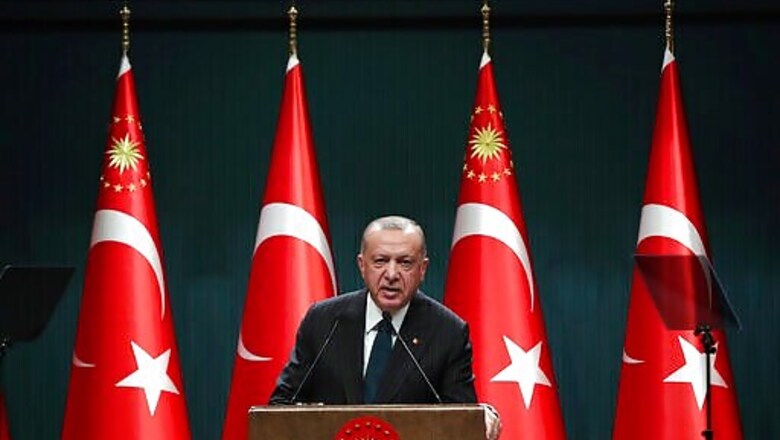
views
ATHENS, Greece: Germany’s foreign minister appealed Tuesday for a de-escalation of tension in the eastern Mediterranean between NATO allies Greece and Turkey, warning that a spark could lead to a disaster.
The two neighbors have been locked in an increasingly acrimonious dispute for weeks, placing their militaries on alert and sending warships to shadow each other, over maritime boundaries and offshore prospecting rights.
Both countries have announced military exercises starting Tuesday in sections of a broad area between Crete and Cyprus, where the Turkish research vessel Oruc Reis is carrying out seismic research escorted by Turkish warships.
Greece says the vessel is over its own continental shelf, where it has exclusive rights on potential undersea gas and oil deposits, and has sent its own warships to shadow the Turkish flotilla. Turkey is also prospecting for hydrocarbons in waters where Cyprus claims exclusive economic rights.
The current situation in the eastern Mediterranean is … playing with fire, and any spark — however small — could lead to a disaster, German Foreign Minister Heiko Maas said after meeting with his Greek counterpart Nikos Dendias. No one can have an interest in that, and certainly not in a military confrontation between NATO partners and neighbors.
Maas said he had traveled to Athens with two messages: One message is that Germany and the whole European Union stand by Greece in firm solidarity,” he said. The other — equally important — message is that what we now need absolutely and immediately are signals of de-escalation and a readiness for dialogue.
Dendias accused Turkey of continuing to provoke its neighbor and displaying neo-Ottoman ideology, referring to Ankara’s perceived desire to revive the Ottoman Turkish empire that once ruled most of the east Mediterranean, including Greece. He insisted Athens would protect its sovereign rights and interests against its much bigger and more heavily armed neighbor.
As we speak, Turkey continues to act illegally, to escalate, to provoke, Dendias said.
Instead of a de-escalation, we are witnessing new provocations. We are witnessing the attempt to implement expansionist aims against neighbors and allies, he continued.
Maass visit comes as Greece begins a navy and air force exercise southeast of Crete and south of the Greek island of Kastellorizo.
Turkeys Defense Ministry said Turkish and allied navy ships would be conducting maritime training in the eastern Mediterranean on Tuesday to promote coordination and interoperability. A Turkish official said the training would last for a few hours only. Turkish media reported the exercise would be conducted south of Crete.
Adding to the tangle of overlapping drills, Cyprus Defense Ministry said warplanes and navy ships from France, Italy, Greece and Cyprus would be holding air and sea military exercises off the east Mediterranean island nation starting Wednesday.
France and Greece will deploy both aircraft and warships as part of the Aug. 26-28 drills, while Cyprus will activate its air defense system to test its capabilities.
A binding and peaceful solution of the disputed questions in the eastern Mediterranean ultimately will only be possible via direct talks between Greece and Turkey, as already were agreed once and should actually long since have taken place,” Maas said.
It is clear that such talks can only take place and be successful in a constructive environment, and for that all destructive activities must be ended and provocations refrained from in the time ahead of us,” he said.
Greece has demanded Turkey withdraw the Oruc Reis. Ankara responded by extending its notification to shipping, known as a Navtex, about the research vessels operations to Aug. 27.
Athens then announced the three-day military exercise. Turkish President Recep Tayyip Erdogan warned on Monday night that as of now, Greece will be the only one responsible for any negative development in the region, and said the Greek exercise endangers the coastal and navigational safety of all ships in the region.
The escalating tension has raised concerns of conflict between the two regional rivals, which have come to the brink of war three times since the mid-1970s, including once over prospecting rights in the Aegean Sea.
Greek Prime Minister Kyriakos Mitsotakis has warned of the danger of an accident when so many military vessels are concentrated in a small area. Earlier this month, Athens said a Greek frigate and a Turkish frigate escorting the Oruc Reis collided. No injuries were reported on either side. Greek media reported the Turkish frigate had suffered minor damage above the waterline.
Maas was heading to Ankara after his stop in Athens, where he was to meet Turkish Foreign Minister Mevlut Cavusoglu Tuesday evening. His trip comes ahead of a meeting of EU foreign ministers in Berlin later this week, at which Turkey will be discussed.
____
Geir Moulson reported from Berlin. Elena Becatoros in Athens, Greece, Suzan Fraser in Ankara, Turkey, and Menelaos Hadjicostis in Nicosia, Cyprus, contributed to this report.
Disclaimer: This post has been auto-published from an agency feed without any modifications to the text and has not been reviewed by an editor



















Comments
0 comment